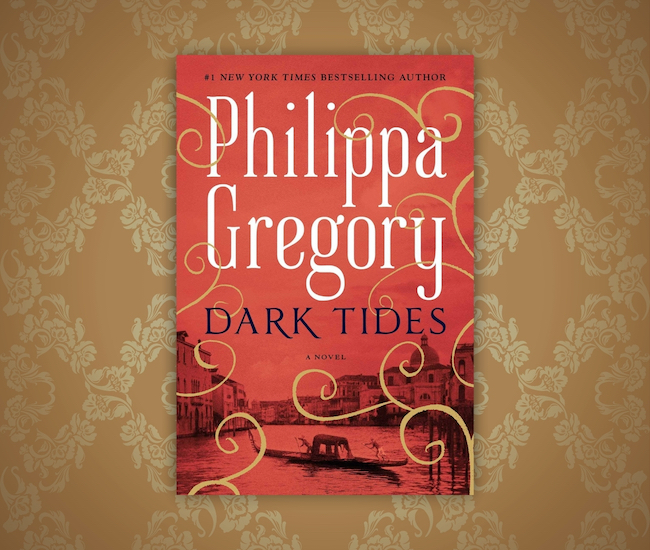Dark Tides
https://booktrib.com/wp-content/uploads/2020/11/Dark-Tides-Philippa-Gregory.jpg
Dark Tides (Atria Books) by Philippa Gregory is the second book in The Fairmile Series, following Tidelands. In full disclosure, I have not read the first book, which recounts the story of Alinor Reekie, a midwife who runs afoul of the social codes of behavior for women of her era to harrowing results.
The plot of Dark Tides holds together on its own merits with the events of book one merely serving as backstory, which Gregory masterfully sprinkles in with just enough detail to keep confusion at bay, while at the same time sparking curiosity. While it was not necessary to have read Tidelands, it whetted my appetite for doing so.
A CUNNING AND CRUEL DECEIT … BUT WHY?
Dark Tides is set in 1670, two decades after the events of book one, and finds Alinor living as a wharf owner in London with her daughter and granddaughter. The first half of the book revolves around the introduction of Livia, wife of Alinor’s son, Rob. Livia arrives at the Reekies’ Wharf with her infant and informs Alinor that Rob has drowned in a Venice lagoon. Alinor, though, has “the sight” and is convinced Livia is lying. The reader quickly becomes certain that Alinor is correct and figuring out exactly what Livia is up to drives the narrative.
Watching Livia’s manipulations unfold is fascinating, as she is skilled in using her beauty to manipulate most people. She tells just enough truth, and confesses just enough falsehood, to seem believable, and whenever anyone gets suspicious she uses her sexuality to distract them. Her ability to read the room and gaslight her audience is spectacular.
For me, the book really takes off in the second half when Alinor’s granddaughter, Sarah, sneaks off to Venice in search of her uncle Rob. Gregory’s depictions of Venice in the era are fascinating, from the canaled landscape to the underground prison, and from the quarantine islands to the network of spies. It is here that Sarah encounters the dashing Felipe and the romance factor heats up. Once Sarah uncovers the truth, she returns to London for the inevitable climactic showdown with Livia.
DUAL STORYLINES TAKE US TO OPPOSITE SIDES OF THE ATLANTIC
Meanwhile, a parallel storyline follows Alinor’s brother, Ned, who has settled in a colony in New England. This reads almost like a separate, though connected, character-driven novel. Ned is a man caught between his English upbringing and his preference for the Native American sensibility. As friction between the colonists and the nearby tribes ratchets up, Ned is forced to choose his future.
Gregory’s research into the Native American tribes in New England in the late 17th century includes the expected interesting tidbits about food, dress and housing. The showstopper, though, is the Native American concept of story holes, which tribes dug to commemorate special events and then used for navigation. What an appealing concept!
Gregory shines brightest in her ability to capture the contrasting personalities of the settings in America and Venice. The characters of both Ned and Livia provide a stark contrast to one another but are each thought-provoking in their own right.
The novel successfully generates interest in the other book in the series (and, one hopes, future books). In many ways, it seems to serve as a bridge in the series, transitioning from Alinor’s story in Tidelands to the story of the younger generation, which one imagines will continue into book three — while also setting up a more plot-driven story I suspect is building for Ned.
I enjoyed Dark Tides as a standalone, but suspect that those who read Tidelands will enjoy all that I did, as well as have the pleasure of a reunion with already beloved characters.
https://booktrib.com/wp-content/uploads/2020/11/Philippa-Gregory.jpg
About Philippa Gregory:
Philippa Gregory is one of the world’s foremost historical novelists. Her flair for blending history and imagination developed into a signature style and Philippa went on to write many bestselling novels, including The Other Boleyn Girl and The White Queen. Now a recognized authority on women’s history, Philippa graduated from the University of Sussex and received a PhD from the University of Edinburgh. Philippa is a member of the Society of Authors and in 2016, was presented with the Outstanding Contribution to Historical Fiction Award by the Historical Writers’ Association. In 2018, she was awarded an Honorary Platinum Award by Nielsen for achieving significant lifetime sales across her entire book output.



